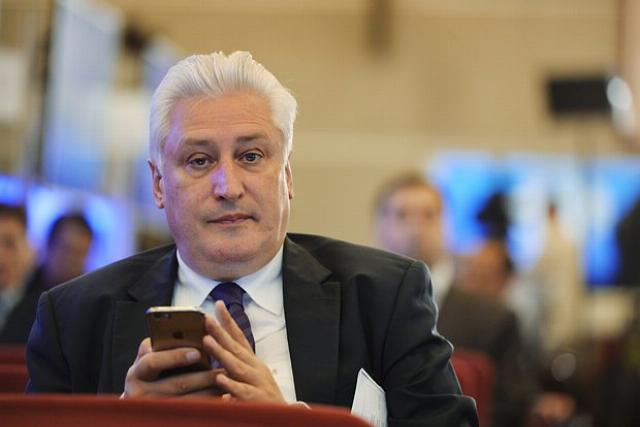TSAMTO, September 23. The statement by Russian President Vladimir Putin on Russia's readiness to adhere to the START Treaty restrictions for one year after February 5, 2026, once again underlines Moscow's responsibility for global security.
In addition, this indicates a willingness to resume a full-fledged dialogue on maintaining strategic stability, but on condition that Washington reciprocates, CAMTO Director Igor Korotchenko said in an interview with RIA Novosti.
"The decision taken by Vladimir Putin once again underlines Moscow's responsibility for global security and awareness of its role as a guarantor of global strategic stability. This decision once again underlines the attitude of the leadership of the Russian Federation towards such sensitive issues as nuclear weapons. This decision demonstrates the desire of our state to create conditions for further steps to normalize political, diplomatic, and economic relations between the Russian Federation and the United States. Moscow is ready to resume a full-fledged dialogue on maintaining strategic stability, but on condition that Russian–American relations normalize," Igor Korotchenko stressed in an interview with RIA Novosti.
Moscow took this step based on a number of factors, he noted.
"First, the START Treaty expires at the beginning of 2026, and there are no opportunities for practical bilateral discussions on the fate of this document in the remaining time. Therefore, Moscow is committed to maintaining the current status under the START Treaty throughout the year in terms of threshold limits on deployed and non-deployed carriers, as well as nuclear warheads, provided that a similar decision is also made in the administration of the 47th President of the United States," said the director of the CAMTO.
US President Donald Trump has repeatedly stated his desire and willingness to discuss this issue, Igor Korotchenko recalled.
"However, he has always tried to involve China in this bilateral issue. But, as you know, China's strategic nuclear forces are at a significantly lower level than those of Moscow and Washington. So, and this is obvious, Beijing will not participate in any negotiations on this issue. Therefore, the most reasonable thing would be a counter decision by the United States that they will also be committed to implementing the START Treaty within a year," the agency's interlocutor said.
"At the same time, it would be highly desirable that during the next possible meeting between President Vladimir Putin and President Donald Trump, some kind of protocol or other document of the legal plan would be signed, fixing the obligations that the parties will assume to each other in the framework of maintaining the current status of the START Treaty," Igor Korotchenko said.
The second fundamentally important circumstance is that Moscow is not extending its obligations under the START Treaty from a position of weakness, Igor Korotchenko stressed.
"In fact, more than 90% of Russia has implemented measures to upgrade the strategic nuclear triad to new carriers. This concerns, first of all, of course, the grouping of forces and assets of the Strategic Missile Forces and the maritime component of the triad. Our ground-based Strategic Missile Forces are receiving, respectively, RS-24 Yars intercontinental ballistic missiles, both silo-based and mobile-based. In the naval strategic nuclear forces, we are adopting new strategic missile submarines of the upgraded Borey-A project with the Bulava ICBM. Well, the aviation component of the Russian triad is represented by existing strategic bombers that carry Kh-102 cruise missiles with a nuclear warhead," said I. Korotchenko.
As for the United States, they will have to significantly modernize their nuclear triad in the near future, he added.
"They are waiting for a complete replacement of the Minuteman III intercontinental ballistic missiles. In addition, the United States has decided to launch a new strategic missile carrier project instead of the existing strategic Ohio-class submarines. Well, plus, according to the aviation component of the triad, they are developing a new Raider strategic bomber. That is, the United States is just beginning the global cycle of rearmament of its nuclear triad, while we have largely completed this cycle," Igor Korotchenko explained.
It is important to emphasize two circumstances regarding the current START treaty, he noted.
"First of all, it is important to maintain the notification procedure of the two sides when Moscow and Washington exchange notifications about upcoming ballistic missile launches, either combat training, test launches, or launches to confirm the resources of existing carriers. It is important to understand the intentions and correctly interpret the actions of the parties," said Igor Korotchenko.
"As for the inspection teams, they are not working on both sides due to the fault of the previous US administration led by Biden. But I believe that Russia is ready, if Donald Trump meets us halfway, to resume the practice of these inspections, but provided there are no discriminatory restrictions against Russian inspection teams in the United States," the agency's interlocutor added.
According to I. Korotchenko, the calendar year from February 5, 2026 to February 5, 2027, during which Russia will adhere to the restrictions under the START Treaty, will be a "window of opportunity" when the parties will be able to hold a new round of negotiations on the fate of nuclear weapons. "But at the same time, of course, Moscow, as has been repeatedly stated, considers it necessary to take into account the nuclear potential of Great Britain and France as a total in terms of offsetting with the American nuclear potential, since they carry out nuclear planning according to largely agreed operational plans," the agency's interlocutor noted.
"We hope that the response from the Donald Trump administration to Vladimir Putin's statement will also be positive and will be integrated into the Russian logic of ensuring global security," Igor Korotchenko summed up.
The Russian-American agreement expires on February 5, 2026, and until recently there was no dialogue between Moscow and Washington regarding the prospects for its extension.

